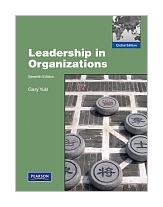|
||
• wydawnictwa polskie
• Zamów informacje o nowościach z wybranego tematu • kontakt
• Cookies na stronie |
LEADERSHIP IN ORGANIZATIONS GLOBAL EDITIONYUKI G.wydawnictwo: PEARSON ED , rok wydania 2009, wydanie VIIcena netto: What makes an effective leader? This book discusses theories of leadership and provides practical advice for business leaders. This text provides a balance of theory and practice as it surveys the major theories and research on leadership and managerial effectiveness in formal organizations. Changes in the Seventh Edition include a reorganization of chapters to make room for additional material while maintaining the unique structure that addresses both academics and practitioners. The text now covers ethical, spiritual, servant, and authentic leadership and discusses diversity in leadership roles. Table of Contents
1. Introduction: The Nature of Leadership
Definitions of Leadership Indicators of Leadership Effectiveness Overview of Major Research Approaches Level of Conceptualization for Leadership Theories Other Bases for Comparing Leadership Theories Organization of the Book Summary Review and Discussion Questions 2. Managerial Traits and Skills
Nature of Traits and Skills Research on Leader Traits and Skills Managerial Traits and Effectiveness Managerial Skills and Effectiveness Other Relevant Competencies Situational Relevance of Skills Evaluation of the Trait Research Applications for Managers Summary Review and Discussion Questions
3. The Nature of Managerial Work Typical Activity Patterns in Managerial Work The Content of Managerial Work Demands, Constraints, and Choices Research on Situational Determinants Changes in the Nature of Managerial Work How Much Discretion Do Managers Have? Limitations of the Descriptive Research Applications for Managers Summary Review and Discussion Questions
4. Perspectives on Effective Leadership Behavior Ohio State Leadership Studies Michigan Leadership Studies Limitations of Survey Research Experiments on Task and Relations Behavior Research Using Critical Incidents The High-High Leader Leadership Behavior Taxonomies Specific Task Behaviors Specific Relations Behaviors Evaluation of the Behavior Approach Summary Review and Discussion Questions
5. Participative Leadership, Delegation, and Empowerment Nature of Participative Leadership Consequences of Participative Leadership Research on Effects of Participative Leadership Normative Decision Model Applications: Guidelines for Participative Leadership Delegation Applications: Guidelines for Delegating Perceived Empowerment Summary Review and Discussion Questions 6. Early Contingency Theories of Effective Leadership LPC Contingency Model Path-Goal Theory of Leadership Situational Leadership Theory Leadership Substitutes Theory Multiple Linkage Model Cognitive Resources Theory General Evaluation of Contingency Theories Applications for Adaptive Leadership Summary Review and Discussion Questions 7. Power and Influence Conceptions of Power and Authority Power Types and Sources Consequences of Position and Personal Power How Power is Acquired or Lost How Much Power Should Leaders Have? Influence Tactics Power and Influence Behavior Use and Effectiveness of Influence Tactics Summary Review and Discussion Questions 8. Dyadic Relations, Attributions, and Followership Leader-Member Exchange Theory Leader Attributions About Subordinates Applications: Correcting Performance Deficiencies Follower Attributions and Implicit Theories Impression Management Follower Contributions to Effective Leadership Self-Management Applications: Guidelines for Followers Integrating Leader and Follower Roles Summary Review and Discussion Questions
9. Charismatic and Transformational Leadership
Two Early Theories Attribution Theory of Charismatic Leadership Self-Concept Theory of Charismatic Leadership Other Conceptions of Charisma Consequences of Charismatic Leadership Transformational Leadership Primary Types of Research on the Theories Transformational vs. Charismatic Leadership Evaluation of the Theories Applications: Guidelines for Leaders Summary Review and Discussion Questions
10. Leading Change in Organizations Change Processes in Organizations Influencing Organization Culture Developing a Vision Applications: Procedures for Developing a Vision Implementing Change Applications: Guidelines for Implementing Change Innovation and Organizational Learning Applications: Guidelines for Increasing Learning and Innovation Summary Review and Discussion Questions 11. Ethical, Servant, Spiritual, and Authentic Leadership Conceptions of Ethical Leadership Dilemmas in Assessing Ethical Leadership Determinants and Consequences of Ethical Leadership Transforming Leadership and Adaptive Problem Solving Servant Leadership Spiritual Leadership Authentic Leadership Comparison and Evaluation of Theories Increasing Ethical Leadership Summary Review and Discussion Questions
12. Leadership in Teams and Decision Groups The Nature of Teams Determinants of Team Performance Leadership in Different Types of Teams Procedures for Facilitating Team Learning Applications: Guidelines for Team Building Decision Making in Groups Leadership Functions in Meetings Applications: Guidelines for Leading Meetings Summary Review and Discussion Questions
13. Strategic Leadership by Top Executives How Leaders Influence Organizational Performance Constraints on Executives Conditions Affecting the Need for Strategic Leadership Executive Tenure and Strategic Leadership Political Power and Strategic Leadership Research on Effects of CEO Leadership Strategic Leadership by Executive Teams Two Key Responsibilities for Top Executives Summary Review and Discussion Questions
14. Developing Leadership Skills Leadership Training Programs Designing Effective Training Special Techniques for Leadership Training Learning from Experience Developmental Activities Self-Help Activities Facilitating Conditions for Leadership Development A Systems Perspective on Leadership Development Summary Review and Discussion Questions 15. Gender, Diversity, and Cross-cultural Leadership
Introduction to Cross-cultural Leadership Cross-cultural Leadership Research: Types and Difficulties The GLOBE Project Cultural Value Dimensions and Leadership Evaluation of the Cross-cultural Research Gender and Leadership Managing Diversity Summary Review and Discussion Questions
16. Overview and Integration
Major Findings in Leadership Research Explanatory Processes and Levels of Conceptualization Toward an Integrating Conceptual Framework Biases in the Conceptualization of Leadership Biases in Research Methods Emerging Conceptions of Leadership Concluding Thoughts Review and Discussion Questions Case: Turnaround at Nissan
Appendix: Cases
References Author Index Subject Index 648 pages, Paperback Księgarnia nie działa. Nie odpowiadamy na pytania i nie realizujemy zamówien. Do odwolania !. |


